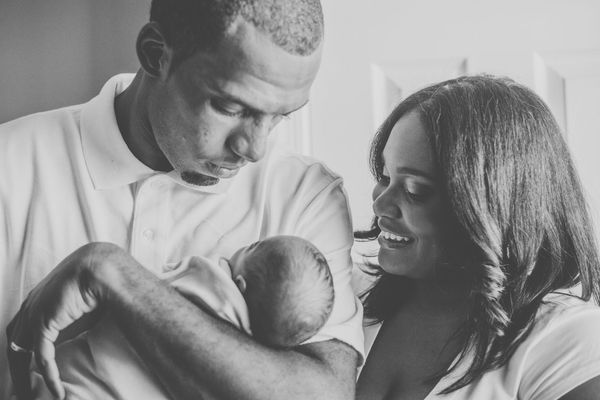It's a well-known fact that many women experience postpartum depression after giving birth. While a new baby is indeed cause for celebration, about 15 percent of new mothers fall into a severe and long-lasting form of the "baby blues," known as postpartum depression, or PPD.
But did you know that men can also experience postpartum depression? Yes, new dads can get sad, too. Having a new baby can be hard on the whole family.
The Pacific Post Partum Support Society, a program that began in 1971 as a grassroots initiative, estimates the number of men affected with PPD to be as high as 10 percent, and, if their partner is also coping with PPD, it can climb much higher. Parents Magazine reports that number to spike to as high as 26 percent three to six months after the baby's arrival—twice the rate of depression usually seen in men.
PPD is common among women and should not be a cause of shame or self-blame. It's easy to understand how PPD can develop. After all, having a baby creates so many changes and upheavals. Not only are a woman's body and hormones altered and in flux, but so is her life, her responsibilities and routines and the way she and her partner relate to one another. Sleep deprivation also can play a big role in postpartum depression, as does a weak support system, having multiple births or experiencing difficulty with breastfeeding.
Read more about living with postpartum depression.
Likewise, men can also feel anxious and tired, overwhelmed by the weight of caring for a new baby or their depressed partner. Most at-risk are young fathers and those with a history of depression. Having financial struggles and relationship problems can add to that risk. And having a fussy or colicky baby can make the most patient among us angry, anxious or ready to collapse in sobs.
Interestingly, there is another pregnancy-related condition that affects men. Known as Couvade syndrome (or sympathetic pregnancy), it's when the partner experiences many of the same symptoms as the expectant mother, among them weight gain, heartburn, sleeplessness, altered hormone levels, reduced libido and morning sickness.
Similar to women, men should not blame themselves or be reluctant or embarrassed to admit how they're feeling. Though men may be used to being stoic and tough, it's important to reach out to a health care professional and family for support for PPD. Here are some red flags:
- The signs and symptoms last longer than two weeks
- The feelings continue to worsen
- Caring for the baby is difficult
- It's tough to complete everyday tasks
- You have thoughts of harming yourself or the baby
PPD can be treated and can improve with psychotherapy, medication or both. Left untreated, PPD can interfere with infant/parent bonding and can have a ripple effect, leading to emotional and behavioral problems for the children.
There are also healthy lifestyle choices that may help speed recovery, according to the Mayo Clinic. These include:
- Setting realistic expectations
- Making time for yourself
- Avoiding isolation
- Getting adequate rest
- Avoiding alcohol
- Including exercise in your daily routine
With proper treatment and support, men and women do recover from PPD and go on to enjoy and embrace their new role as parents. And one day, when they're sending their child off to college or to the outside world, there's a good chance they'll be crying again—but for very different reasons!
References
https://www.apa.org/topics/women-girls/postpartum-depression







